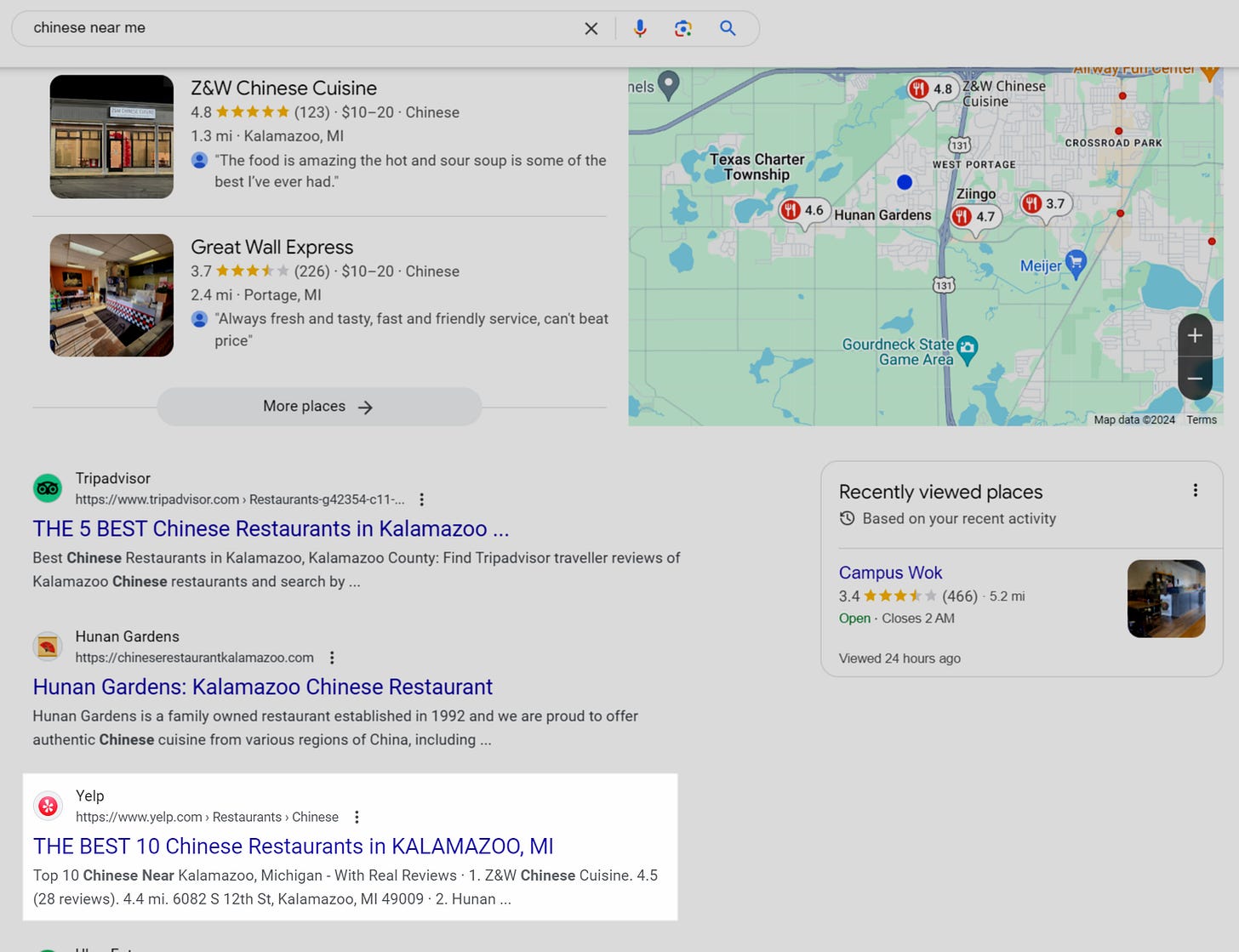Augmentation
Yelp sues Google for SERP Features - justified?
A warm welcome to 264 new Growth Memo readers who joined us since last week! Join the ranks of Amazon, Microsoft, Google and 14,300 other Growth Memo readers:
Get paid up to $600 / hour to give marketing feedback!
I know, this sounds too good? It’s not. Wynter needs your help.
All you need is a Linkedin, job title, and marketing brain.
Check out Wynter!
Yelp filed an antitrust lawsuit against Google for stifling competition and keeping searchers in its walled garden.1 Almost a month after Google was declared to be a monopoly, Yelp brings forward legal complaints for using SERP Features to keep traffic on its site and illegally scraping and using Yelp’s content.
In a CEO statement, Yelp lists interesting research papers about the impact of SERP Features on organic traffic and implied revenue. After dissecting the referenced papers and comparing them with my own findings from +7,000 results, I can confirm that the impact on traffic from most SERP Features is negative. Most companies have no idea about the traffic impact of SERP Features and how to develop strategies that factor them in.
Click drainer
SERP Features are Google’s way of augmenting search results with potentially helpful direct answers. You search for inspiration, and Google shows you images and video carousels. You search for products, and Google shows you stores near you that carry them or carousels of products you can buy online. The benefit for companies is that they get a channel to customers with a stronger purchase intent. The risk is that Google sends out less traffic. In some cases, SERP Features can make a whole class of keywords redundant for SEO.
Yelp’s announcement cites an interesting paper from Germany by Fubel et al.: “Beyond Rankings: Exploring the Impact of SERP Features on Organic Click-through Rates”, which highlights the traffic impact of SERP Features.2
The cliff notes:
Goal: The study sought to find out to what extent SERP features extend or inhibit clicks to organic results.
Method: The researchers compared predicted CTR with actual CTR for SERP features across 6 million clicks, 24 million impressions, 67k keywords and 43 e-commerce stores from May to August 2022. To reduce noise, they filtered out any result below 20 impressions.
Results: the presence of most SERP features hurts CTR. Most SERPs show 4-6 SERP Features. Some SERP Features decrease clicks on all web results, others lower clicks on the first 3 results and raise them for the others, but most SERP Features improve CTR for sites linked in them and reduce it for everyone else.
It’s refreshing to see SERP Features researched scientifically. One challenge of researching SERP Features and Google results, in general, is that findings quickly become stale because Google makes so many changes. SERP layouts can change daily, and Google constantly introduces new SERP Features. One example is shopping, where Google introduced free listings and query refinements since the study came out (in 2023).
To add to the paper, I conducted my own analysis of 1,000 random keywords across 7,869 results (US) and found overlapping results:
Organic results appear most often in position 2 (73.6%) rather than 1 (51.5%)
Knowledge graphs are the SERP Feature most often appearing in position 1, followed by popular products (5.7%)
Discussions & Forums hover mostly around positions 3 to 6
Video and image carousels often appear in positions 4-6
Related searches or popular products often appear in position 6-9
Knowledge graphs seem to be the most click-draining SERP Feature, with an increased impact on mobile due to the screen real estate they occupy. Related to findings in the German research paper, searches that return a knowledge graph are hard to monetize in nature because users are exploring a topic. As a result, Google keeps users on the platform until they express more transactional intent.
An example is the keyword “male hair growth”, where Google displays ads, organic listings and a knowledge card.

Another example is the keyword “insurance policies”, where Google shows a Featured Snippet and a Knowledge Card.
The impact is much more severe on mobile, where Google gives the answer and makes many organic results redundant.
Strategically, SERP Features cannot replace a #1 rank, but they can enhance traffic returns as long as you’re in the top 10 results. The key to factoring SERP Features into your SEO strategy is a) monitoring them and b) prioritizing keywords accordingly.
For monitoring, you need a solution (either a 3rd party tool or building your own solution with an API) that helps you understand which keywords show what kind of SERP Feature over time. Certain SERP Features, like Knowledge Graphs and Local Packs, can significantly lower clicks. All the search volume in the world doesn’t matter if you don’t get the clicks.
For prioritization, you need to prioritize keywords according to the findings in the German research paper and my analysis: target image carousels, free shopping listings and video carousels.
That said, one SERP Feature bears a bigger risk than any other: AI Overviews. In a world where users get direct answers to complex questions from LLMs, there is less space for SERP Features, which are most useful for shorter search queries.
Sundar Pichai: “People are using it to Search in entirely new ways, and asking new types of questions, longer and more complex queries, even searching with photos, and getting back the best the web has to offer.”3
The impact of AI on search is also the real motivation for the Yelp lawsuit.
The real motivation
Yelp’s traffic has been flat over the last 3 years.
The assumption is that Yelp loses organic traffic due to local packs (which do draw tons of clicks away from organic results, in my experience). But total and organic traffic is flat. The defining moment for Yelp’s place in Search was between 2010 and 2020 when Google’s display of local packs increased.
Yelp was at the top of its game around 2013/2014, as we can see based on brand searches, after which SERP Features tanked Yelp’s traffic (ranks remained mostly stable).

The more logical conclusion for the lawsuit is that Yelp wants to get back at Google and is worried about the impact of AI. If SERP Features can harm the business that much, AI could sink it.
Example: When you search for “chinese near me” on Google, Yelp ranks #3 (under the local pack).
On Gemini, Google only cites Google Maps. And Google is pushing Gemini: Users can now directly chat with the LLM from their browser's search bar.
So, how should aggregators adjust their strategy for chatbots?
The adjustment in the shift toward AI answers is to:
a) increase your web footprint to hopefully be included in training data
b) forge agreements to provide your data as an API
c) build your own AI agent / product
Yelp has built its own AI agent / product.4 What’s interesting is that Yelp’s AI Chatbot doesn’t help you find businesses in your surroundings but allows you to describe a problem and then recommends professionals who can help, which looks much more like Angi. AI assistants lead some companies to compete much closer than before.
Yelp’s mistake is launching on the native app (iOS) instead of the web. Sure, that might come out soon, but the key to making AI agents successful is to funnel as many visitors to them as possible, not just the users you already have.
Tripadvisor, which shows its AI agent prominently on the homepage, is a good example.
TripAdvisor CEO Matt Goldberg on the Q3 2023 earnings call:
Importantly, members who build an itinerary also generate on average three times higher revenue than the average Tripadvisor member and the average member already monetizes at approximately 10 times the rate of non-members.













